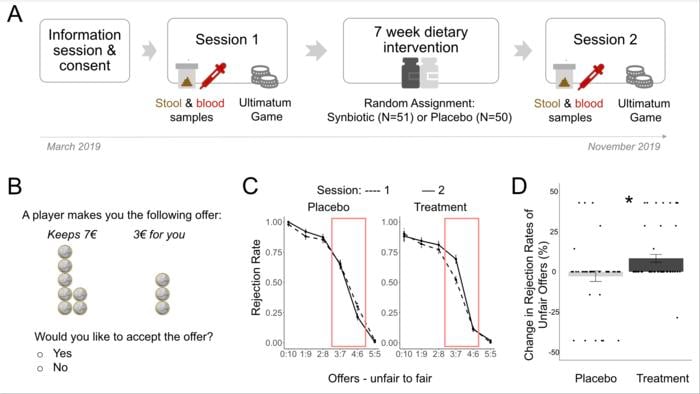In the intricate dance of human behavior, the unseen partners may be the trillions of microbes residing in our gut. A new study by Hilke Plassmann and colleagues suggests that altering the gut microbiome with pro- and prebiotics could make people more attuned to fairness, even when it means earning less money themselves.
The Ultimatum Game: A Test of Altruistic Punishment
The researchers recruited 101 participants, half of whom took a supplement containing Lactobacillus and Bifidobacterium for seven weeks, while the other half received placebos. Before and after the supplementation period, all participants played the “ultimatum game,” a two-player scenario where one player controls a pot of money and offers a share to the second player, who can either accept the offer or reject it, leaving both players empty-handed. Rejecting an unfair offer, known as “altruistic punishment,” means sacrificing potential gains to punish the other player for being ungenerous.
Gut Bacteria Shift Linked to Increased Fairness Sensitivity
After taking the probiotics, participants were more likely to reject offers, particularly those in the 30%–40% range. The effect was most pronounced in players who started with a high ratio of Firmicutes to Bacteroidetes bacteria in their gut, and who experienced the greatest changes in gut composition. Interestingly, the supplements reduced levels of tyrosine, a dopamine precursor, in some participants’ blood, and this group showed the most significant increase in altruistic punishment.
The findings suggest that shifting the gut microbiome towards a healthier state may make people less rational and more sensitive to social considerations. As Plassmann and her team continue to explore this uncharted territory, the implications could reach far beyond the laboratory. From boardrooms to courtrooms, from negotiations to relationships, the invisible inhabitants of our gut may be subtly shaping our sense of fairness and our willingness to stand up for it, even at a personal cost.
Paper Abstract
There is increasing evidence for the role of the gut microbiome in the regulation of socio-affective behavior in animals and clinical conditions. However, whether and how the composition of the gut microbiome may influence social decision-making in health remains unknown. Here, we tested the causal effects of a 7-week synbiotic (vs. placebo) dietary intervention on altruistic social punishment behavior in an ultimatum game. Results showed that the intervention increased participants’ willingness to forgo a monetary payoff when treated unfairly. This change in social decision-making was related to changes in fasting-state serum levels of the dopamine-precursor tyrosine proposing a potential mechanistic link along the gut–microbiota–brain-behavior axis. These results improve our understanding of the bidirectional role body–brain interactions play in social decision-making and why humans at times act “irrationally” according to standard economic theory. See full paper
If our reporting has informed or inspired you, please consider making a donation. Every contribution, no matter the size, empowers us to continue delivering accurate, engaging, and trustworthy science and medical news. Independent journalism requires time, effort, and resources—your support ensures we can keep uncovering the stories that matter most to you.
Join us in making knowledge accessible and impactful. Thank you for standing with us!

